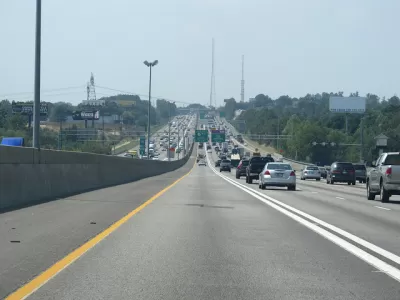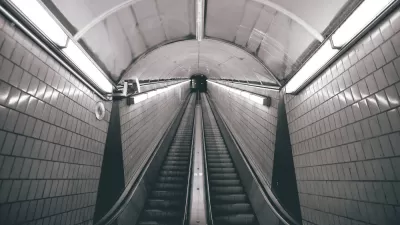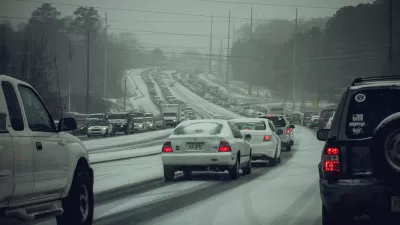The destruction of an expanse of I-85 in Atlanta means the heavily travelled freeway will be closed for months. The disaster that was predicted to follow, however, has so far failed to materialize.

Joe Cortright sets the scene:
It had all the trappings of a great disaster film: A spectacular blaze last week destroyed a several-hundred-foot-long section of Interstate 85 in Atlanta. In a city that consistently has some of the worst traffic congestion in the country, losing a key link in its freeway system could only mean one thing: Carmageddon.
But all hell did not break loose. In fact, writes Cortright, "predictions of terrible traffic in the wake of even major disruptions to the road system are almost never realized."
So why is that? According to Cortright:
Arguably, our mental model of traffic is just wrong. We tend to think of traffic volumes, and trip-making generally as inexorable forces of nature. The diurnal flow of 250,000 vehicles a day on an urban freeway like I-85 is just as regular and predictable as the tides. What this misses is that there’s a deep behavioral basis to travel. Human beings will shift their behavior in response to changing circumstances.
That argument is supported by one columnist's somewhat satirical approach to the days following the bridge collapse: George Mathis writes of the experience of being forced to take MARTA.
Cortright too makes one last appeal for the nation to keep a close eye on the experience of Atlanta as it goes about daily life without the use of I-85: "If the one of the nation’s most sprawling and traffic ridden cities can survive the loss of a freeway segment that carries a quarter million vehicles a day, it’s a strong sign that more modest changes to road systems really don’t have much impact on metropolitan prosperity."
FULL STORY: What Happened to Atlanta's Carmageddon?

Maui's Vacation Rental Debate Turns Ugly
Verbal attacks, misinformation campaigns and fistfights plague a high-stakes debate to convert thousands of vacation rentals into long-term housing.

Planetizen Federal Action Tracker
A weekly monitor of how Trump’s orders and actions are impacting planners and planning in America.

In Urban Planning, AI Prompting Could be the New Design Thinking
Creativity has long been key to great urban design. What if we see AI as our new creative partner?

Florida Seniors Face Rising Homelessness Risk
High housing costs are pushing more seniors, many of them on a fixed income, into homelessness.

Massachusetts Budget Helps Close MBTA Budget Gap
The budget signed by Gov. Maura Healey includes $470 million in MBTA funding for the next fiscal year.

Milwaukee Launches Vision Zero Plan
Seven years after the city signed its Complete Streets Policy, the city is doubling down on its efforts to eliminate traffic deaths.
Urban Design for Planners 1: Software Tools
This six-course series explores essential urban design concepts using open source software and equips planners with the tools they need to participate fully in the urban design process.
Planning for Universal Design
Learn the tools for implementing Universal Design in planning regulations.
Gallatin County Department of Planning & Community Development
Heyer Gruel & Associates PA
JM Goldson LLC
City of Camden Redevelopment Agency
City of Astoria
Transportation Research & Education Center (TREC) at Portland State University
Jefferson Parish Government
Camden Redevelopment Agency
City of Claremont





























